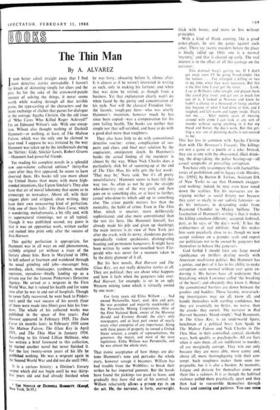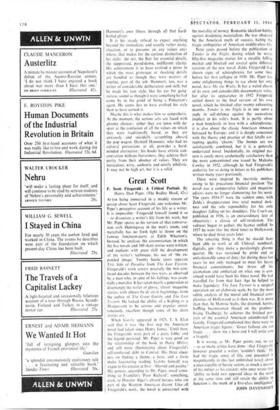HEM
The Thin Man
By A. ALVAREZ
T HAD better admit straight away that I find imost detective stories unreadable. I haven't the knack of skimming simply for clues and the plot. So for the sake of the crossword-puzzle interest of solving the things, it never seems worth while wading through all that terrible prose, the type-casting ot the characters and the inane exchange of clichés that passes for dialogue in the average Agatha Christie. On the old issue of 'Who Cares Who Killed Roger Ackroyd?' I'm on Edmund Wilson's side. With one excep- tion. Wilson also thought nothing of Dashiell Hammett—or nothing, at least, of The Maltese Falcon, which was the only one he claimed to have read. I suppose he was.irritated by the way Hammett was taken up by the intellectuals during the 'thirties: Gide, Sinclair Lewis, Robert Graves —Hammett had powerful friends.
Yet reading his complete novels in a splendid new one-volume collected edition,* thirty-five years after they first appeared, he seems to have deserved them. His books tell you more about the United States than many with more high- minded intentions, like Upton Sinclair's. They also have that air of moral lobotomy that seems so to preoccupy us nowadays. Above all, with their elegant plots and stripped, clean writing, they have their own unwavering kind of perfection. Only one of them fails: The Dain Curse, which is wandering, melodramatic, a bit silly and, with its supernatural trimmings, not at all typical. Though it was published second, my guess is that it was an apprentice work, written earlier and rushed into print only after the success of Red Harvest.
This quirky perfection is appropriate, for HaMmett was in all ways an odd phenomenon, stylishly original yet without a trace of the literary about him. Born in Maryland in 1894, he left school at fourteen and wandered through the usual grinding odd jobs—messenger boy, newsboy, clerk, timekeeper, yardman, machine operator, stevedore—finally landing up as a private eye for the famous Pinkerton's Detective Agency. He served as a sergeant in the First World War, but it ruined his health and for some time after he was in and out of hospitals. Though he never fully recovered, he went back to Pinker- ton's until the vast success of his novels (four of them were made into films) gave him his free- dom. The whole of his collected works was published in the space, of five years: Red Harvest appeared in February 1929, The Dain Curse six months later; in February 1930 came The Maltese Falcon, The Glass Key in April 1931, and The Thin Man in January 1934. According to his friend Lillian Hellman, who has written a brief foreword to this collection, he started another novel but never finished it. For the last twenty-seven years of his life he Published nothing. He was a sergeant again in the Second World War and did not die until 1961.
It is a curious history: a lifetime's literary output which did not begin until he was thirty- five years old and had already finished when * THE NOVELS OF DASHIELL HAMMETT. (Knopf. New York, $6.95.)
he was forty; obscurity before it, silence after. It is almost as if he weren't interested in writing as such, only in making his fortune; and when that was done he retired, as though from a business. Yet that explanation clearly won't do when faced by the purity and concentration of his style. Nor will the classical Freudian line: the, laconic, tough-guy hero—who was utterly Hammett's invention, however much he has since been copied—was a compensation for his own failing health. The books are neither that simple nor that self-satisfied, and have to do with a good deal more than toughness.
They also have little to do with conventional detective routine: crime, complication of sus- pects and clues, and final neat solution by the omniscient, omnipotent sleuth. In Hammett's books the actual finding of the murderer is almost by the way. When Nick Charles does a particularly slick bit of summing-up at the end of The Thin Man, his wife gets the last word : "That may be,' Nora said, 'but it's all pretty unsatisfactory.' Hammett seems to have felt that way too. As often as not he gets the straight who-done-itry out of the way early and then goes on to something else, or at least to further, casual who-done-its which add up to something else. The crime puzzle matters less than the mentality, the habit of crime. Even in The Thin Man, which is smarter, more deliberately sophisticated, and also more conventional than the rest (its hero, like Hammett himself, has already made his pile and given up sleuthing), the main interest is its view of New York just after the crash, with its nervy, slanderous parties, sporadically violent speakeasies, disintegrating boozing and permanent hangovers. It might have been written by some sour-mouthed Scott Fitz- gerald who was never for a moment taken in by the dizzy glamour of it all.
But his best novels, Red Harvest and The Glass Key, are not really detective stories at all. They are political; they are about what happens and how it feels when the gangsters take over. Red Harvest, for example, is set in an ugly Western mining town which is virtually owned by one man :
For forty years old Elihu Willson . . . had owned Personville, heart, soul, skin and guts. He was president and majority stockholder of the Personville Mining Corporation, ditto of the First National Bank, owner of the Morning Herald and Evening Herald, the city's only newspapers, and at least part owner of nearly every other enterprise of any importance. Along with these pieces of property he owned a United States senator, a couple of representatives, the governor, the mayor, and most of the state legislature. Elihu Willson was Personville, and he was almost the whole state.
That ironic acceptance of how things are dic- tates Hammett's tone and pervades the whole story, however savage it becomes. Willson has had trouble from the Wobblies; to break their strikes he has imported gunmen. But the hoods have found the pickings too good to leave, and gradually they have slid out of his control. So Willson reluctantly allows a private eye in on the act. He, the narrator, is forty, overweight, thick with booze, and more or less without principles.
With a kind of blank cunning, like a good poker-player, he sets the gangs against each other. There are twenty murders before the place is finally tidied up. Only one is a normal 'mystery,' and that is cleared up early. The real interest is in the effect of all this carnage on the narrator:
This damned burg's gettine me. If I don't get away soon I'll be going blood-simple like the natives . . . I've arranged a killing or two in my time. %hen they sere necessary. But this is the first lime I ever got the fever. . . . Look. I sat at ■Aillson's table tonight and played them like you'd play trout, and got just as much fun out of it. I looked at Noonan and knew he hadn't a chance in a thousand ot living another day because of what I had done to him, and I laughed, and felt warm and happy inside. That's not me. . . After twenty years of messing around with crime I can look at any sort of murder without seeing anything in it but my bread and butter, the day's work. But this get- ting a rear out of planning deaths is not natural to me.
This has less in common with Aga:ha Christie than with The Revenger's Tragedy. The killings are not a game or a puzzle or a joke. Instead, they are at one with the obsessional, illicit drink- ing, the drug-taking, the police beatings-up—all casual symptof6s of prevailing corruption.
You have only to compare this with factual his- tories of prohibition and its legacy (vide Murder, Inc. [1951], by Burton B. Turkus, Assistant DA of New York) to see that Hammett exagger- ated nothing; indeed, he may even have toned down the realities. Yet his massacres are in- triguing neither as social history nor because they cater so nicely to our sadistic fantasies—as do his imitators, in descending order from Raymond Chandler to Mickey Spillane. The fascination of Hammett's writing is that it makes the killing somehow different : accepted, habitual, part, as he says, of 'the day's work.' It has the ordinariness of real nihilism. And this makes him seem peculiarly close to us, though we now accept violence on a grander scale and expect our politicians not to be owned by gangsters but themselves to behave like gangsters.
God forbid I should foist any large moral significance on thrillers dealing mostly with American small-town politics. But Hammett has a genius, and part of it lies in his ability to make corruption seem normal without ever quite en- dorsing it. His heroes have all undergone that brutalising which Lawrence called 'the breaking of the heart'; and obscurely they know it. Hence the conventional barriers are down between the goodies and baddies. Those laconic, wise-crack- ing investigators may see all, know all, and handle themselves with startling confidence, but they are essentially no better, no worse, than the crooks they outwit. The narrator in Red Harvest becomes 'blood-simple'; Ned Beaumont, in The Glass Key, is an underworld figure, henchman of a political boss; Sam Spade in The Maltese Falcon and Nick Charles in The Thin Man, in their controlled, cynical, alcoholic ways, both qualify as psychopaths. All are liars when it suits them. all are indifferent to murder, all are marginally corrupt. They win out only because they are more able, more canny and, above all, more thoroughgoing with their con- tempt. Such toughness makes them seem im- pregnable, but it is also a burden. At moments, fatigue and distaste for themselves come over them like a sickness. It is as though the habitual violence pulled them psychically apart and they then had to reassemble themselves through booze and cunning and patience. You can sense
Hammett's own illness through all that hard- boiled glitter.
It is his steady refusal to expect anything beyond the immediate, and usually rather nasty, situation, or to presume on any values any- where, that makes for the curious distinction of his style: the wit, the flair for essential details, the suppressed, pared-down, indifferent clarity. His achievement is to have evolved a prose in which the most grotesque or shocking details are handled as though they were matters of routine, part of the job. Hammett, too, was a writer of considerable deliberation and skill, but he made his taut style, like his ear for gang- sterese, sound as though it were something he had come by in the grind of being a Pinkerton's agent. He seems less to have evolved his style than to have earned it.
Maybe this is what makes him so sympathetic. At the moment, the serious arts are faced with gloomy choices: either they are tense with de- spair at the confusion of all the values on which they were traditionally based, or they are anxiously—and suicidally—scrambling aboard the pop wagon. Dashiell Hammett. who had no cultural pretensions at all, provides a hard- minded alternative: his books have artistic con- centration without literariness. they achieve their purity from their absence of values. They are meticulous, witty. authentic and utterly nihilistic. It may not be high art, but it is a relief.



































 Previous page
Previous page